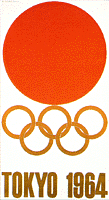HISTORY OF THE MODERN OLYMPICS
Tokyo, Japan, 1964
 |
| Olympic posters from the Archives, Olympic Museum Lausanne, from the book The Olympic Spirit, published by Tehabi Books |
More than 5,000 athletes from 93 nations competed. The track-and-field competition saw new Olympic records set in 27 of the 36 events. The star performer was Peter Snell of New Zealand, who captured the gold medal in both the 800- and 1,500-metre runs. Snell was the only non-American to win a men's track event. The U.S. team included Bob Hayes, who won the 100-metres, and Billy Mills, the surprise winner of the 10,000-metre run. Abebe Bikila of Ethiopia won his second marathon. The women's competition featured the Press sisters, Irina and Tamara, of the Soviet Union. Irina won the gold medal in the pentathlon, Tamara the gold in the shot put and the discus.
The swimming competition boasted new Olympic records in every event and a dozen world records. Again the Australian and U.S. teams dominated, winning all but one of the events. American Don Schollander won two individual gold medals and two relay golds.
The gymnast Vera Cáslavská of Czechoslovakia won the first of her two career individual gold medals in the combined exercises. Soviet gymnasts Boris Shakhlin and Larissa Latynina ended their Olympic careers with gold medal performances. Soviet wrestler Aleksandr Medved won the first of his three career gold medals. Anton Geesink of the Netherlands was the surprise champion of the open division of the judo competition.
Introduction * Early History * Revival of the Olympics * Organization of the Modern Games